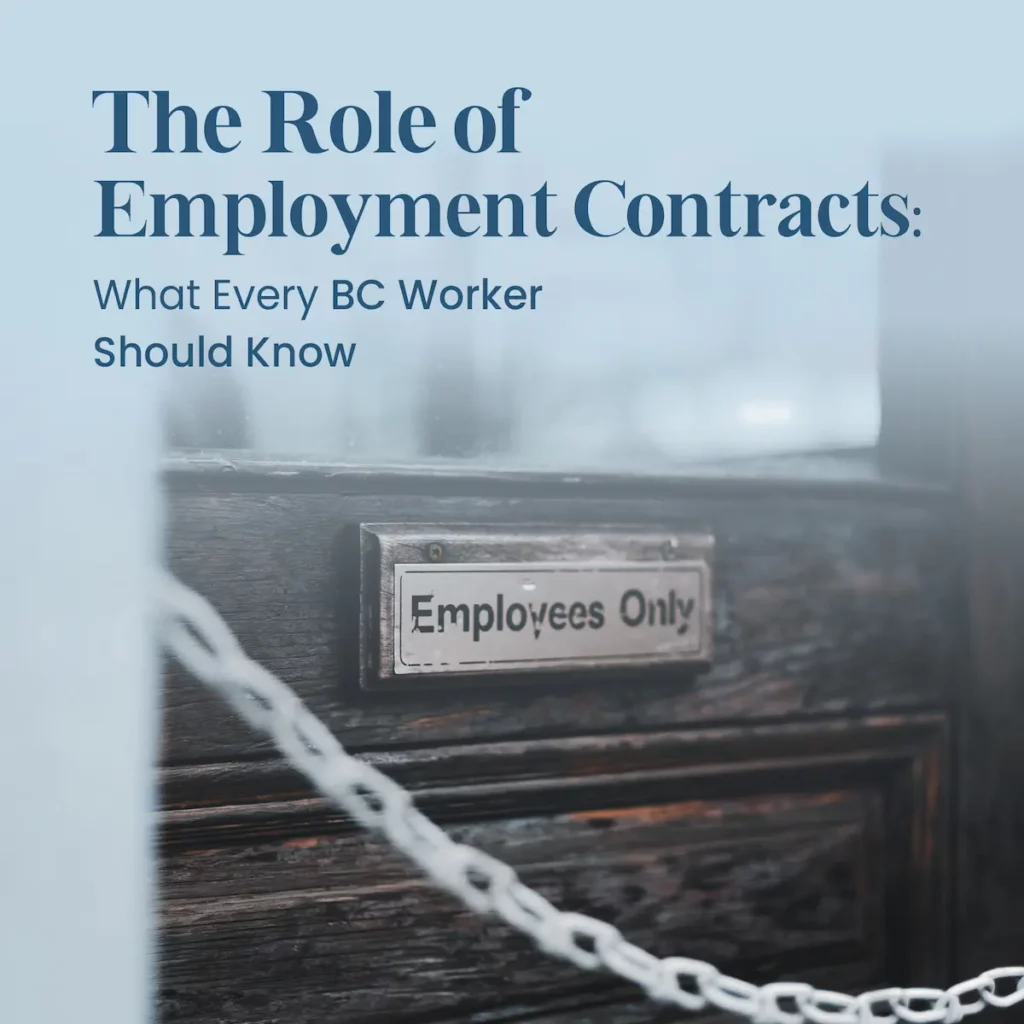Have you ever wondered what you’re agreeing to when you sign an employment contract at a new job in British Columbia?
While many workers focus on salary, work hours, or the excitement of starting a new role, they often overlook one of the most important documents they’ll sign: the employment contract. Whether you’re an employee or an employer, understanding the role of an employment contract is essential to protecting your rights and setting clear expectations.
In this blog, we’ll explore what employment contracts are, why they matter, common clauses you should look out for, and how Sorensen Truong LLP can help you understand and negotiate your employment agreement.
Understanding Employment Contracts in British Columbia
An employment contract is a legally binding agreement between an employer and an employee that sets out the terms of the working relationship. In British Columbia, these agreements can be written, verbal, or implied, but having a written employment contract is highly recommended. It provides both parties with clear expectations and legal protection.
Common Types of Employment Contracts in BC
There are three primary types of employment agreements used across BC workplaces:
- Indefinite-Term Employment Contracts: The most common type, these agreements do not include a set end date. They continue until either the employee or employer decides to end the relationship, typically with notice.
- Fixed-Term Employment Contracts: These contracts have a specific end date and are often used for temporary, seasonal, or project-specific positions. Both employers and employees need to understand the legal implications of early termination in such contracts.
- Independent Contractor Agreements: Unlike employee contracts, these apply to independent contractors. They outline the terms of service delivery but differ significantly in areas like employment standards, tax obligations, and termination rights.
Why Employment Contracts Are Important in BC
In British Columbia, many individuals sign employment contracts without fully understanding their implications. However, these agreements are far more than just paperwork—they are vital tools that:
- Clearly define your job duties, performance expectations, and workplace responsibilities
- Specify compensation, benefits, working hours, and paid vacation entitlements
- Lay out the terms for termination, including severance pay and notice periods
- Help limit liability for both employers and employees in the event of disputes
- Safeguard intellectual property, confidential business information, and trade secrets
- Include post-employment restrictions such as non-compete, non-disclosure, or non-solicitation clauses
Failing to review your employment contract or misunderstanding its terms can lead to significant consequences. You may inadvertently waive important employment rights, lose access to termination compensation, or find yourself restricted in future job opportunities.
Key Clauses to Watch For
Here are some common and often misunderstood employment contract clauses BC workers should be aware of:
1. Termination Clauses
Termination language is one of the most critical parts of any contract. Some contracts attempt to limit severance to Employment Standards Act (ESA) minimums, which can be far less than what you’d be entitled to under common law. Always be wary of clauses that waive your rights to reasonable notice.
2. Probationary Period
Employers often include a 3- to 6-month probation period during which they can terminate employment with little to no notice. However, even during probation, you still have basic rights under the ESA.
3. Non-Competition & Non-Solicitation
These clauses aim to prevent you from working for a competitor or soliciting clients or employees after leaving your role. In BC, courts typically view non-compete clauses skeptically unless they are reasonable in scope and duration.
4. Confidentiality & Intellectual Property
Most contracts will include clauses requiring you to keep company information private and assign intellectual property rights to the employer. These can have long-term implications for professionals in tech, design, and other creative fields.
5. Dispute Resolution
Some contracts include arbitration clauses or specify how disputes should be handled. These can affect your ability to take legal action if conflicts arise.
Verbal and Implied Agreements
Even if you don’t sign a formal contract, you may still be in a contractual relationship. Verbal promises made during hiring, such as bonuses, work-from-home flexibility, or future promotions, can sometimes be legally enforceable if they’re communicated and relied upon. Similarly, implied terms like the right to a safe work environment or notice of termination can be read into employment relationships by law.
Can You Negotiate an Employment Contract?
Yes! Many workers don’t realize they can and often should negotiate the terms of their employment contract. This is particularly true for:
- Executives and senior professionals
- Workers being asked to sign restrictive covenants
- Employees transitioning from contractor to full-time status
- Situations involving termination or severance language
Negotiation doesn’t need to be confrontational. With the help of an experienced employment lawyer, you can ensure your rights are protected while maintaining a good relationship with your employer.
How Sorensen Truong LLP Can Help
Navigating employment contracts on your own can be intimidating, especially when legal jargon is involved. At Sorensen Truong LLP, we specialize in Employment Law and offer personalized, cost-effective legal support to workers across British Columbia.
Our employment lawyers can:
- Review and explain contract terms
- Negotiate better employment terms on your behalf
- Identify unfair or unlawful clauses
- Assist with wrongful dismissal or severance claims
- Advocate for your rights in court, arbitration, or mediation if needed
We also work closely with employers to draft enforceable and fair employment agreements that align with current BC laws and protect their business interests.
Whether you’re reviewing your first job offer or dealing with a complex executive contract, our team is here to provide clear guidance and strong representation.
Final Thoughts: Know Your Rights Before You Sign
In British Columbia, your employment contract plays a critical role from the moment you accept a job offer. It’s not just paperwork; it’s a legally binding document that defines your rights, responsibilities, and protections in the workplace. Whether you’re entering a new role, negotiating terms, or dealing with termination or severance, understanding your contract is essential.
Before signing an employment agreement, take the time to carefully review every clause. Pay close attention to details about termination provisions, non-compete clauses, benefits, and working conditions. A lack of clarity today could lead to major legal or financial consequences down the road.
If you’re unsure about any aspect of your employment agreement, it’s wise to consult with a qualified employment lawyer in British Columbia.
At Sorensen Truong LLP, we help employees and employers across BC understand and enforce their rights under employment law. Whether you need help reviewing a contract, negotiating terms, or addressing a workplace dispute, our legal team is here to guide you with experience and clarity.





